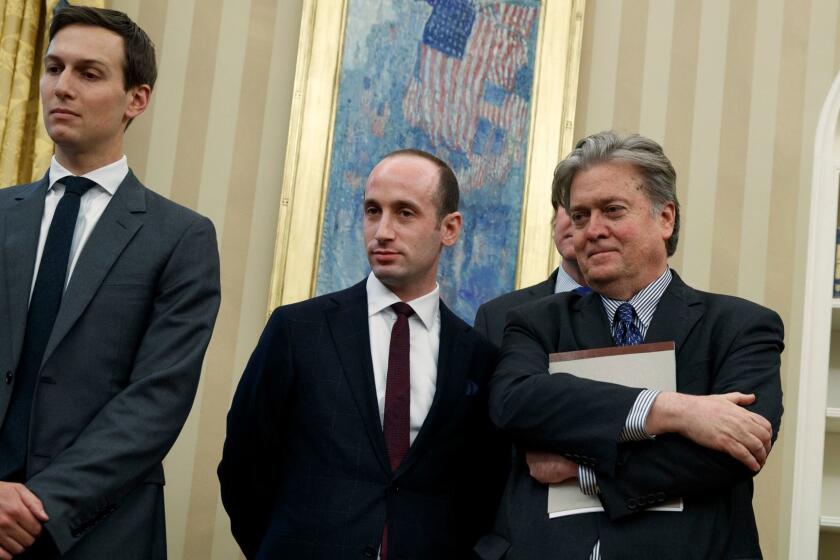Why California offers hope for the end of Trumpism — and the future of the country

- Share via
In 2013, the Republican Party released the “Growth and Opportunity Project,” colloquially known as the Republican autopsy report. In the wake of Barack Obama’s 2012 reelection, the study argued in part that the GOP must reject bigotry and accept America’s growing diversity.
Three years later, Donald Trump showed you could win another way. And four years after that, on Monday night, on the eve of an election Trump looked likely to lose, three authors conducted a slightly premature autopsy of their own during a panel at the L.A. Times Festival of Books; they also offered a cautiously upbeat prognosis for the nation — so long as it learns the lessons of California.
Moderated by Times Editorial Page editor Sewell Chan, the online conversation featured writer and public radio host Kurt Andersen; journalist Jean Guerrero, author of the Stephen Miller biography “Hatemonger”; and former Republican strategist Stuart Stevens, cofounder of the Anti-Trump Lincoln Project.
Chief coroner at the autopsy was Stevens, the author of a recent GOP vivisection, “It Was All a Lie.” After Chan asked whether, assuming a loss on Tuesday, the GOP could ever claw its way back toward the mission of that 2013 report, he was characteristically blunt: “The only thing the Republican Party is going to be moved by is total fear, which will have to come with defeat, which I think will probably start tomorrow.” Even so, he added, it’s too late for the party to change; the nation is moving too fast. “Once Texas becomes Democratic, which may happen tomorrow, you won’t see another Republican president … There’s no path. It’s over.”
The panelists agreed that if the GOP is defeated, the immediate cause of death will be Trump, but the political pathology runs much deeper. Andersen, whose book “Evil Geniuses” traces the political roots of inequality, blamed the “Faustian bargain” struck in the ’70s between economic and cultural conservatives: “As they were losing the demographic race, they kept doubling down” on religious and racial appeals, he said of the Republican party. “The dog whistles turned into louder and louder whistles and with Donald Trump a bullhorn of outright racism, xenophobia and the rest.”
Jean Guerrero, author of “Hatemonger,” talks about the making of Stephen Miller, who helped make Trump president, then remade the U.S. immigration system.
Guerrero pinpointed one unlikely hotbed of that shift: California. Stephen Miller, Trump’s hardline anti-immigration senior advisor and speechwriter, came of age in Santa Monica in “a very different California than you see today,” Guerrero said. The demographic shifts now changing America — Stevens pointed out that the majority of Americans under 15 are nonwhite, “and odds are really good they’re gonna turn 18 and still be nonwhite and start voting” — came to California first and the backlash was swift.
During the ’90s, under Republican Gov.Pete Wilson, “there was unprecedented anti-immigrant hostility on both sides of the political aisle,” Guerrero said. “There were bipartisan statewide attacks on affirmative action, bilingual education, on public education for undocumented immigrants.” There was talk of “the ‘invasion’ of the border — a lot of the rhetoric that we see Trump using today and that we see Stephen Miller writing into Trump’s speeches.”
The panelists saw this as not just a useful historical analogy but a hopeful one. “What’s going to happen to the Republican Party is what happened to the GOP in California after Pete Wilson,” Stevens said. “It’s going to become less relevant to the discussion.” Under a possible President Biden, as in deep-blue California, Stevens foresaw national debates not between left and right but rather left and center.
“I think we have two parties inside the Democratic Party,” said the former Republican strategist. “We have a Sanders party and we have a Biden party. And I think the future of major public policy decisions in America is going to be decided between those two elements.” He predicted that “Sen. Harris is going to dominate American politics. I think she’s probably gonna be president for two terms, eventually things will go too far in various ways … and some center-right party will emerge because there’s a market for it.”
To Andersen, the rifts among Democrats seem “somewhat overstated,” he said. “I hope and I believe that, being so close to the abyss tonight, and until tomorrow or the end of the week or whenever we find out who [wins], will be a chastening experience to keep a lot of solidarity in place.” Moreover, Andersen celebrated the party’s leftward shift, placing some of the blame for Trump on centrist Democrats — including Andersen himself in the ’90s — who had left the working class open to populist appeals: “If there was precious little difference in economic terms, why not vote for someone who hates the same people I hate?”
None of the panelists were ready to pop the Champagne just yet, especially given Trump’s open determination to delegitimize the vote. “I think it’s the most dangerous situation since the Civil War,” Stevens said. “But I don’t think it’s gonna be close. It really shouldn’t be close. Probably this whole race is over now — 70% have already voted,” and Biden’s lead seemed insurmountable. “Sure, it’s incredibly dangerous, but I think Americans are going to reject that.”
Want to understand how we got to 2020? Look to the 1980s — and two recent books: Kurt Andersen’s ‘Evil Geniuses’ and Rick Perlstein’s ‘Reaganland.’
“To me,” said Andersen, “this election for a long time, the whole four years, has seemed like a cancer diagnosis, right? Where it looks like you’re probably gonna survive, you’re gonna live, but there’s still a — whatever it is, choose your forecasting model, a one in 20 chance, a one in 10 chance or something greater — that you’re gonna die, and that’s scary. And that’s the place we’re in tonight.”
Nor would a clear result necessarily break the fever, even if the transition is peaceful. Stevens said the work of the Lincoln Project, which has been running anti-Trump attack ads for months, will continue beyond Trump.
“Trumpism is at the core of the Republican Party now,” said Stevens. “We’ll maybe take a day off, but we’ll be right back at it. We see ourselves as a pro-democracy group. And what’s happening with Trumpism is part of a global, authoritarian illiberal movement” — from Poland to Germany, where neo-Nazis have been hailing Trump. He said the Lincoln Project plans to expand to Europe.

Guerrero warned that Trump’s more conspiracy-minded followers will have to be reckoned with — maybe even deprogrammed. Examining Miller’s journey helped her understand how any American can become radicalized, and the role of fear and propaganda in creating the conditions for illiberalism anywhere. “If we’re going to come together as a nation,” she said, “we have to understand how people fall into these rabbit holes.”
The President’s “only niece,” clinical psychologist Mary Trump, portrays a man warped by his family in “Too Much and Never Enough.”
A victory against Trump would be a “step away from the abyss,” said Andersen. “You don’t want to go the other way, because that’s death, but it’s only the first step. It’s a crucial step, but we have to keep walking, we have to keep finding ways to bring what I think is the majority of Americans who believe in decency and fairness with us — to abandon this ugly movement on the ash heap of history, where it must belong if America is going to keep being a country we’re proud of.”
More to Read
Sign up for our Book Club newsletter
Get the latest news, events and more from the Los Angeles Times Book Club, and help us get L.A. reading and talking.
You may occasionally receive promotional content from the Los Angeles Times.










